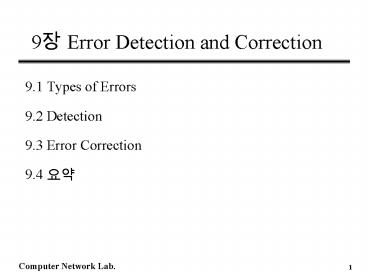9 Error Detection and Correction - PowerPoint PPT Presentation
1 / 36
Title:
9 Error Detection and Correction
Description:
For reliable communication, error must be detected and corrected ... The secret of error correction is to locate the invalid bit or bits ... Error Correction(cont'd) ... – PowerPoint PPT presentation
Number of Views:1403
Avg rating:3.0/5.0
Title: 9 Error Detection and Correction
1
9? Error Detection and Correction
- 9.1 Types of Errors
- 9.2 Detection
- 9.3 Error Correction
- 9.4 ??
2
Error Detection and Correction
- Data can be corrupted during transmission. For
reliable communication, error must be detected
and corrected - are implemented either at the data link layer
or the transport layer of the OSI model
3
9.1 Type of Errors
4
Type of Errors(contd)
- Single-Bit Error
- is when only one bit in the data unit has
changed (ex ASCII STX - ASCII LF)
5
Type of Errors(contd)
- Multiple-Bit Error
- is when two or more nonconsecutive bits in the
data unit have changed(ex ASCII B - ASCII LF)
6
Type of Errors(contd)
- Burst Error
- means that two or more consecutive bits in the
data unit have changed
7
9.2 Detection
- error detection uses the concept of
redundancy, which means adding extra bits for
detecting errors at the destination
8
Detection(contd)
- Redundancy
9
Detection(contd)
- Detection methods
- VRC(Vertical Redundancy Check)
- LRC(Longitudinal Redundancy)
- CRL(Cyclical redundancy Check)
- Checksum
10
Detection(contd)
- VRC(Vertical Redundancy Check)
- a parity bit is added to every data unit so
that the total number of 1s(including the parity
bit) becomes even for even-parity check or odd
for odd-parity check
11
Detection(contd)
- Even parity VRC concept
12
Detection(contd)
- LRC(Longitudinal Redundancy Check)
- parity bits of all the positions are assembled
into a new data unit, which is added to the end
of the data block
13
Detection(contd)
- LRC calculation
14
Detection(contd)
- CRC(Cyclic Redundancy Check)
- is based on binary division.
15
Detection(contd)
- CRC generator
- uses modular-2 division.
- Binary division
16
Detection(contd)
- Polynomials
- CRC generator(divisor) is most often
represented not as a string of 1s and 0s, but as
an algebraic.
17
Detection(contd)
- A polynomial representing a divisor
18
Detection(contd)
- Standard polynomials
19
Detection(contd)
- Checksum
- used by the higher layer protocols
- is based on the concept of redundancy(VRC,
LRC, CRC .)
20
Detection(contd)
- Checksum Generator
21
Detection(contd)
- To create the checksum the sender does the
following - The unit is divided into K sections, each of n
bits. - Section 1 and 2 are added together using ones
complement. - Section 3 is added to the result of the previous
step. - Section 4 is added to the result of the previous
step. - The process repeats until section k is added to
the result of the previous step. - The final result is complemented to make the
checksum.
22
Detection(contd)
- data unit and checksum
23
9.3 Error Correction
- can be handled in two ways
- ? when an error is discovered, the receiver can
have the sender retransmit the entire data unit. - ? a receiver can use an error-correcting code,
which automatically corrects certain errors.
24
Error Correction(contd)
- Single-Bit Error Correction
- parity bit
- The secret of error correction is to locate the
invalid bit or bits - For ASCII code, it need a three-bit redundancy
code(000-111)
25
Error Correction(contd)
- Redundancy Bits
- to calculate the number of redundancy bits (R)
required to correct a given number of data bit (M)
26
Error Correction(contd)
- If the total number of bits in a transmittable
unit is mr, then r must be able to indicate at
least mr1 different - 2r ? m r 1
- ex) For value of m is 7(ASCII) , the smallest r
value that can satisfy this equation is 4 - 24 ? 7 4 1
27
Error Correction(contd)
- Relationship between data and redundancy bits
Number of Redundancy Bits (r)
Number of Data Bits (m)
Total Bits (mr)
1 2 3 4 5 6 7
2 3 3 3 4 4 4
3 5 6 7 9 10 11
28
Error Correction(contd)
- Hamming Code
- developed by R.W.Hamming
- positions of redundancy bits in Hamming code
29
Error Correction(contd)
- each r bit is the VRC bit for one combination of
data bits - r1 bits 1, 3, 5, 7, 9, 11
- r2 bits 2, 3, 6, 7, 10, 11
- r4 bits 4, 5, 6, 7
- r8 bits 8, 9, 10, 11
30
Error Correction(contd)
- Redundancy bits calculation(contd)
31
Error Correction(contd)
- Redundancy bits calculation
32
Error Correction(contd)
- Calculating the r values
33
Error Correction(contd)
- Error Detection and Correction
34
Error Correction(contd)
- Error detection using Hamming Code
35
Error Correction(contd)
- Multiple-Bit Error Correction
- redundancy bits calculated on overlapping sets
of data units can also be used to correct
multiple-bit errors.
36
9.4 ??































